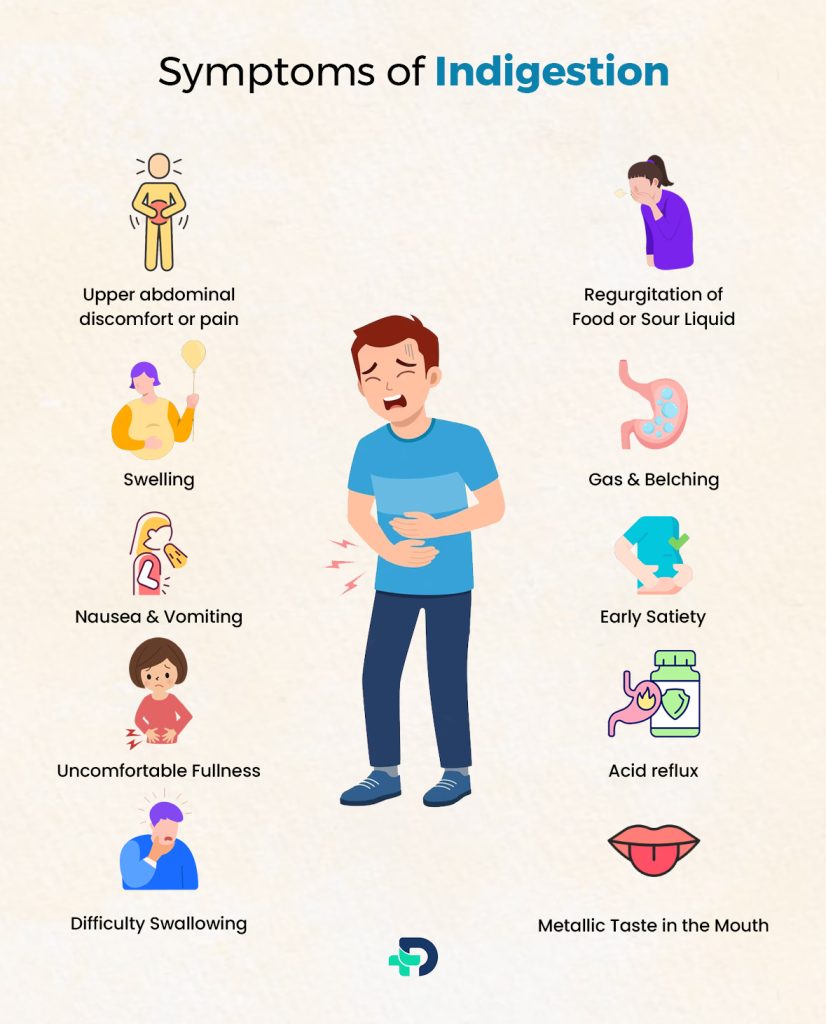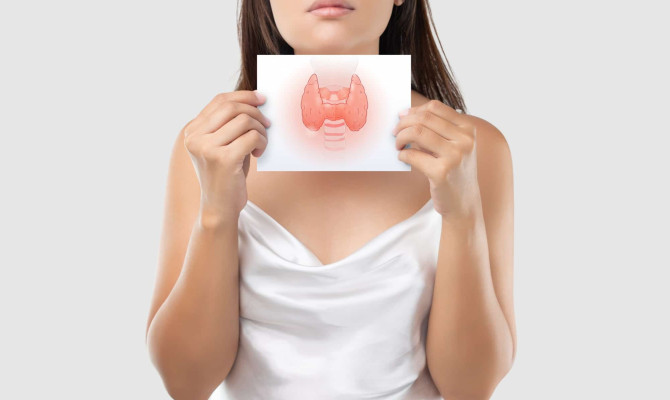All about Indigestion

- Indigestion
- 25 Aug 2023
Overview
About Indigestion:
Indigestion is an increasingly prevalent issue in the United States. Indigestion, called dyspepsia, is discomfort or pain in the upper belly. According to the American College of Gastroenterology, around 25% of Americans experience indigestion annually. While it’s not a dangerous medical disease, it may be inconvenient and interfere with everyday life and general well-being. 1About Indigestion | Researched based study from Gastrointestinal
What is Indigestion?
- A common digestive concern characterized by discomfort or pain in the upper abdomen is indigestion. It is commonly referred to as dyspepsia. 2Indigestion | Researched based study from National Institute of Hydrology
- Occasionally experiencing a little indigestion is natural, particularly after a heavy, spicy meal.
- It manifests as an upset stomach, burning, or abdominal discomfort.
- But for other individuals, it happens daily, lowering their quality of life.
- You must seek medical attention when indigestion becomes a severe issue.
How long does indigestion last?
- You might have symptoms for a few minutes to a few hours after you eat.
- It takes your stomach 3–5 hours to break down a meal before it goes to your bowels.
- During that duration, the liver and gallbladder send bile and bile enzymes to the gut to help digestion.

Causes
Causes of indigestion:
Dyspepsia, another name for indigestion, may have several reasons, from underlying medical issues to lifestyle choices. The most typical causes of indigestion are listed below in further detail:
- Eating too quickly or in excess
- Foods that are oily, greasy, or spicy
- Excessive alcohol or caffeine consumption
- Smoking
- Anxiety and stress
- Medications
- GERD
- Stomach ulcers
- Gallstones
- H. Pylori infection
- Gastroparesis
- Hernia hiatal
- Pancreatitis
- Coeliac disease
- Stomach cancer
Eating too quickly or in excess:
- Overloading the digestive tract with heavy meals or eating too quickly might result in inadequate digestion and pain.
Foods that are oily, greasy, or spicy:
- When the lower esophageal sphincter (LES) relaxes, the stomach acid regurgitates into the esophagus, leading to heartburn and indigestion. These meals can slow down digestion and also relax the LES.
Excessive alcohol or caffeine consumption
- Caffeine and alcohol can cause the stomach lining to become irritated, which may cause indigestion symptoms.
Smoking:
- Smoking cigarettes may disrupt the stomach lining, lower LES pressure, and increase stomach acid production, aggravating indigestion.
Anxiety and stress:
- Emotional stress may affect digestion by influencing stomach acid output and decreasing the passage of food through the digestive system.
Medications:
- Indigestion may result from some medications irritating the lining of the stomach. NSAIDs, aspirin, antibiotics, steroids, and certain antidepressants are examples of possible treatments.
GERD, or gastroesophageal reflux disease
- Constant stomach acid reflux into the esophagus might result in sensations of heartburn and indigestion.
Stomach Ulcers:
- Indigestion can be due to ulcers on the small intestine, stomach, or esophagus lining.
Gallstones:
- Indigestion symptoms may result from gallstones blocking the bile duct, particularly after consuming fatty foods.
H. pylori (Helicobacter pylori) Infection:
- These bacteria may irritate the lining of the stomach and result in gastritis, which brings on indigestion. 3Helicobacter pylori Infection| Researched based study from National Institute of Hydrology
Gastroparesis:
- A disorder that causes bloating and pain when the stomach takes too long to discharge its contents.
Hernia hiatal:
- Indigestion symptoms might result from the stomach sticking out into the chest cavity via the diaphragm.
Pancreatitis:
- In addition to other symptoms like excruciating stomach pain and nausea, pancreatic inflammation may also induce indigestion.
Celiac disease:
- An autoimmune condition where ingesting gluten causes an immunological reaction that damages the small intestine, causing indigestion and nutritional malabsorption.
Stomach cancer:
- Indigestion is a less frequent yet potential sign of advanced stomach cancer.
Risk factors
Risk factors of indigestion:
Age:
- Older people may be more likely to get indigestion because their stomach makes less acid and their digestive systems change.
Certain medical conditions:
- Conditions like gastroparesis (a condition in which the stomach doesn’t empty as quickly as it should), gallstones, pancreatitis, and celiac disease can make indigestion more likely.
Obesity:
- Having too much body fat can put pressure on the stomach and make indigestion more likely.
Pregnancy:
- During pregnancy, indigestion can be due to changes in hormonal levels of the body and the pressure of the growing uterus on the stomach.
Symptoms

Symptoms of indigestion:
While some people may feel uncomfortable, others could suffer more severe symptoms. Here are some typical signs of indigestion:
● Upper abdominal discomfort or pain.
● Acid reflexes
● Swelling
● Gas and belching.
● Nausea and vomiting.
● Early satiety
● Uncomfortable Fullness
● Regurgitation of Food or Liquid:
● Difficulty in swallowing
● Metallic taste in the mouth.
Upper abdominal discomfort or pain 4Upper abdominal discomfort | Researched based study from Healthdirect
- It may be characterized as a dull aching, a gnawing sensation, or a scorching feeling.
Acid reflux:
- The burning feeling or slight pain behind the breastbone in the chest.
Swelling
- Feeling fullness or enlargement in the belly due to gas buildup in the digestive system.
Gas and Belching
- Those who have indigestion often burp or pass gas excessively.
Nausea and Vomiting:
- Some people with indigestion may feel queasy or sick to their stomach, which in more severe instances, may result in vomiting.
Early Satiety:
- A feeling of fullness that follows a little meal. It might be problematic if this symptom results in unintentional weight loss or reduced appetite.
Uncomfortable Fullness:
- A feeling of being excessively or bloated full, even after a little meal.
Regurgitation of Food or Sour Liquid:
- When stomach contents spill back into the mouth, the flavor may be sour or acidic.
Difficulty Swallowing (Dysphagia):
- Indigestion is sometimes accompanied by dysphagia, which might indicate a more serious underlying problem.
Metallic Taste in the Mouth:
- Indigestion sufferers can have a lasting metallic or bitter taste in their mouths.
The signs of indigestion may coexist with those of other digestive conditions, such as gastritis, peptic ulcers, gallstones, and gastroesophageal reflux disease (GERD).
Symptoms like chest discomfort, back pain, jaw pain, and indigestion may be frightening and need quick medical treatment to rule out more severe disorders, including cardiac difficulties.
Diagnosis
Diagnosis of indigestion:
The general process for diagnosing dyspepsia is as follows: 5Diagnosis of indigestio | Researched based study from Southern Cross
Medical History:
- The healthcare professional will start by getting a complete description of the symptoms, their frequency and duration, any situations that make them worse or better, and any other pertinent medical issues the patient could have.
Physical Examination:
- A physical exam will be conducted to look for indications of indigestion’s underlying causes, such as bloating, abdominal discomfort, or other physical abnormalities.
Lifestyle and Food Assessment:
- The doctor may enquire about the patient’s food preferences, smoking, drinking, and caffeine use since these practices might aggravate dyspepsia.
Medication Review:
- The doctor will review the patient’s current prescriptions since certain medicines might aggravate or exacerbate dyspepsia.
Symptom Patterns:
- The doctor will examine the symptoms to see if they are usually indigestion-related or whether they might be indicative of GERD, peptic ulcers, or gallstones.
Rule Out Other Conditions:
- Since indigestion symptoms may coexist with several gastrointestinal problems, the doctor will employ diagnostic testing to rule out other possible causes.
Diagnostic tests:
– Upper endoscopy:
- During this procedure, the esophagus, stomach, and small intestine are examined using a thin, flexible tube with a camera (endoscope).
- It helps detect anomalies, including inflammation, ulcers, and tumors.
– X-rays:
- Abnormal structural structures or obstructions in the digestive system may be seen on upper gastrointestinal (GI) X-rays with barium contrast.
-Blood tests:
- Blood tests may be performed to look for indications of an infection, anemia, or other anomalies connected to dyspepsia.
– Stool tests:
- Stool samples may be examined for Infection or malnutrition indicators.
– Helicobacter pylori (H. pylori) Testing:
- The doctor may advise breath, blood, or stool testing to find the bacteria if they believe it may cause indigestion or peptic ulcers.
The diagnosis of indigestion may be made by exclusion, which means that other illnesses must be ruled out before functional dyspepsia is confirmed.
If a particular cause of indigestion is found, the appropriate course of therapy will be chosen to address it. If no identifiable cause can be identified, care may concentrate on dietary adjustments, lifestyle improvements, and symptom treatment with antacids or acid-reducing medications.
Are heartburn and acidity the same thing?
Acidity and indigestion are both problems with digestion, but they are not the same and they refer to different kinds of stomach pain.
- Acidity is a condition in which the stomach makes too much acid, which can cause symptoms like heartburn, vomiting, and a sour taste in the mouth, among others.
- Indigestion is a group of signs when the stomach has trouble breaking down food. Indigestion is a condition marked by pain or soreness in the upper belly. Several factors can cause it.
Treatment
Treatment for indigestion:
Indigestion is often a minor problem that may be treated with lifestyle modifications and over-the-counter drugs. Medical intervention, however, can be required if indigestion is chronic, severe, or linked to another illness.
What happens if you don’t treat your indigestion?
- Untreated acid reflux may cause long-term esophageal damage or scarring.
- The specifics of the indigestion treatments are as follows:
Prevention
Making lifestyle and dietary changes:
- Adequate nutrition: Eat smaller, more frequent meals daily to reduce overeating and promote better digestion.
- Avoid Trigger meals: Recognize and avoid fatty, oily, spicy, or acidic foods, carbonated drinks, and caffeine, which aggravate indigestion symptoms.
- Eat Slowly and Chew Food Carefully: Eating slowly and chewing food carefully promotes better digestion and lessens the chance of bloating.
- Keep a Healthy Weight: If overweight, decreasing extra weight will help relieve stomach strain and lessen symptoms of indigestion.
- Manage Stress: Stress and worry may aggravate indigestion. Therefore, practicing relaxation methods like deep breathing, meditation, or yoga may be helpful.
Prescription and OTC Drugs:
Antacids: 6Prescription and OTC Drugs | Researched based study from Food and Drug Administration
● By lowering heartburn sensations and neutralizing stomach acid, these drugs may provide rapid relief. E.g., Gaviscon (alginic acid) and Pepto-Bismol (bismuth subsalicylate).
Blockers of H2:
● Ranitidine and famotidine are histamine H2-receptor antagonists that may be used to treat more chronic or frequent indigestion because they lower the production of stomach acid.
Proton Pump Inhibitors (PPIs):
● These medications, such as omeprazole or esomeprazole, prevent the stomach from producing acid, and they are used to treat more severe indigestion or when GERD is a contributory issue.
Elimination of H. pylori:
● If it’s determined that Helicobacter pylori infection is causing your indigestion, your doctor can recommend a course of antibiotics and an acid-reducing drug to get rid of the bacteria.
Treating Underlying Conditions:
● If indigestion is a sign of an underlying illness, such as GERD, peptic ulcers, or gallstones, therapy will be geared toward treating that particular ailment.
Lifestyle changes to prevent GERD:
- Elevate the head of the bed to help prevent acid reflux as you sleep.
- Steer clear of eating just before bed: Lying on a full stomach might exacerbate GERD symptoms.
- Dress comfortably: Tight clothes may push on the stomach and make indigestion worse.
To determine if any underlying medical conditions need particular therapy, more assessment and testing may be required if indigestion symptoms continue after changes in lifestyle and over-the-counter drugs.
What posture relieves acid indigestion the most?
- Studies have shown that sleeping on the left side is preferable to sleeping on the right side or back for those with GERD since the symptoms are less frequent and less severe.
- If you have any experience with clinical manifestations that are keeping you up at night, you must speak with your doctor.
Home Remedies
Home remedies for indigestion:
Mild dyspepsia may be effectively treated with home treatments. The following are some natural treatments for dyspepsia symptoms:
Ginger
- Ginger calms the digestive tract and contains natural anti-inflammatory qualities. Make ginger tea by boiling slices of fresh ginger in water or chewing on a tiny piece of fresh ginger.
Peppermint:
- This herb is renowned for relaxing the stomach. Symptoms of dyspepsia may be relieved by peppermint tea or pills containing peppermint oil.
Chamomile:
- The mild anti-inflammatory and calming effects of chamomile tea might help to relieve indigestion. After meals, have a cup of chamomile tea.
Baking soda:
- Drinking a glass of water with a teaspoon of baking soda may be an antacid, neutralizing stomach acid and relieving heartburn and indigestion.
Fennel Seeds:
- Chewing fennel seeds might aid digestion and lessen gas and bloating after meals.
Aloe Vera Juice:
- Aloe vera juice can relieve indigestion and calm the stomach. Before beginning your meals, sip a cup of aloe vera juice.
Warm Water and Lemon:
- Starting the day with a glass of warm water and a splash of lemon juice will aid digestion.
A Balanced Diet:
- Eating a healthy, well-balanced diet high in fiber, fruits, vegetables, and whole grains will help improve normal digestion and lessen the symptoms of indigestion.
Avoid Trigger meals:
- Recognize and stay away from meals like fatty, oily, spicy, or acidic foods, carbonated drinks, and caffeine that may cause indigestion symptoms.
Which fruits are good for indigestion?
- Bananas, melons, apples, and pears provide vital nutrients and are less prone than acidic fruits like oranges to cause reflux symptoms.
What veggie helps with digestion?
- Broccoli and other cruciferous vegetables like cauliflower, cabbage, and Brussels sprouts have been associated with more diverse gut flora and improved digestive health.
Foods to avoid
Foods to avoid indigestion:
Avoid meals that worsen indigestion. Indigestion-causing meals and drinks include:
- Fried meals, fatty meats, and creamy sauces impede digestion.
- Hot peppers, chili, and curries may irritate the stomach lining and aggravate indigestion.
- Fast food and processed snacks might be hard to digest.
- Grapefruits, oranges, lemons, and tomatoes may cause heartburn and acid reflux, exacerbating indigestion.
- Soda may produce bloating and gas, causing discomfort.
- Coffee, tea, and energy drinks may raise stomach acid and aggravate indigestion.
- Alcohol causes stomach irritation and discomfort.
- Onions and garlic in large amounts might induce bloating and indigestion.
- Chocolate may cause indigestion.
- High-sugar foods might cause bloating.
- Artificial Sweeteners like Sorbitol, mannitol, and xylitol might induce gas and bloating.
- Dairy products may induce gas, bloating, and discomfort in lactose-intolerant persons.
Note that tolerance to food varies individually. Some individuals can tolerate some things better than others. Keeping a food diary and identifying indigestion-causing items might help you customize your diet. Consult a doctor for chronic or severe indigestion.
Complications
Complications of indigestion:
- Stomach acid may erode esophageal tissue, resulting in swelling, bleeding, and sometimes an ulcer.
- Esophagitis may hurt and make swallowing difficult.
- Esophageal stricture, a narrowing of the esophagus will be formed.
- Stomach acid may harm the lower esophagus and result in scar tissue formation.
Takeaways
Key Takeaways:
The next time you feel a burning or painful sensation in your upper belly, remember that indigestion, while familiar, is treatable. You may improve your digestive health and find comfort by changing a few little aspects of your lifestyle, avoiding foods that cause digestive issues, and getting medical advice when necessary. You should take charge of your digestive health to enjoy life without the agony of indigestion.
Any feedback on this article?
 This Articles content was accurate
This Articles content was accurate Very Informative Article
Very Informative Article I have a question or a comment
I have a question or a comment
 This article contains inaccurate content
This article contains inaccurate content This article was not helpful
This article was not helpful I have a question or a comment
I have a question or a comment
We appreciate your helpful feedback!
Checkout our social pages
References
-
Gastrointestinal
About Indigestion
-
National Institute of Hydrology
Indigestion
-
National Institute of Hydrology
Helicobacter pylori Infection
-
Healthdirect
Upper abdominal discomfort
-
Southern Cross
Diagnosis of indigestion
-
Food and Drug Administration
Prescription and OTC Drugs


































